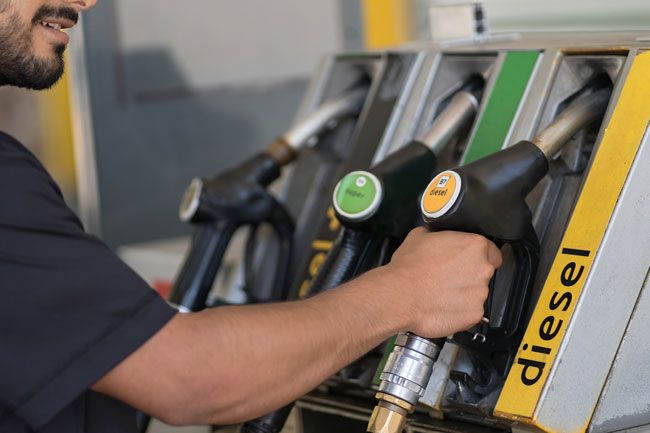
Fuel cards, also known as fleet cards or fleet fuel cards, are a great tool for a business to manage fleet-related expenses. From consolidating fuel spending to offering fuel rebates on every gallon purchased, they can help reduce what a company spends on fueling its fleet.
However, most fleet fuel cards offer additional benefits beyond savings at a gas station or consolidated spending. These alternative forms of payment to credit cards and cash can track all purchase details in real time. With access to up-to-date transaction data, there are many advantages to using a fleet card, two of which can help control spending and provide remarkable insight into your fleet spending trends.
Unlike traditional credit or debit cards, fleet cards offer features tailored to the specific needs of businesses operating a fleet or fleets of vehicles.
These sometimes underutilized fuel card features are customizable spending controls and reporting tools.
Before we get into the details of the benefits of both features, let’s explore fleet card basics.
Understanding Fleet Cards
Fleet cards are a specialized form of payment designed for vehicle-related expenses such as fuel, maintenance, parts, services, etc. Unlike traditional credit or debit cards, fleet cards offer features tailored to the specific needs of businesses operating a fleet or fleets of vehicles.
When appropriately used, fleet cards can be a powerful business solution. Besides savings in the form of rebates and discounts and consolidated spending, fleet cards:
- Track expenses automatically and in real-time.
- Offer customizable purchase controls.
- Are more secure than credit cards and cash.
- May include additional savings or discounts on fleet-related expenses.
- Track driver- or vehicle-specific data.
- Include robust reporting tools for better data analytics.
These features make for an incredibly valuable tool in your fleet manager’s toolbox.
Convenience and Accessibility
All of the details of your fleet account are housed online in a fleet card dashboard. This online account access provides the convenience of viewing diesel and gas transactions, tracking payments and adjusting spending controls remotely. This means fleet managers and business owners can easily monitor and manage company vehicles using the information provided by their fuel cards.
Whether reviewing recent purchases, setting or adjusting spending limits, or analyzing expenses, all can be done from anywhere with internet access due to mobile apps.
Having access to fleet card information at your fingertips while on the move allows for efficient fuel usage monitoring without the need to sift through piles of paperwork or wait for statements to arrive in the mail. Every transaction can be tracked in real time, helping businesses stay on top of their finances.
How Fleet Cards Work
When a driver uses a fleet card at a gas station or service center, the transaction details are captured at the point of sale. These details include:
- Date of purchase.
- Time the purchase was made.
- Location of purchase (address and brand of fuel/gas stations).
- Amount of purchase.
- Volume of fuel purchased.
- Fuel type and grade (gas vs. diesel and unleaded vs. premium).
This information is then accessible to fleet managers online, allowing immediate oversight and analysis of fleet expenses.
Managing Business Expenses with Fleet Cards
Some people have trouble making the jump from a fleet being a form of payment to the fact that they are designed to be a comprehensive fuel expense management tool. Two of the most underused features are expense controls and reporting features.
When used in tandem, these features can simplify fuel expense management on virtually every front.
The Power of Expense Controls
Fleet cards represent a powerful tool for businesses looking to enhance their fleet management practices.
Almost every fuel card comes equipped with expense controls or purchase limits. Usually, these are customizable and include the following parameters:
Time of Day
This limit allows fleet managers to set specific hours a certain fleet card can be used. This is particularly beneficial if an employee has set work hours and does not need to use a card during off hours.
Day of Week
A business can elect to have its fleet cards active on certain days of the week. If a company only operates deliveries Monday through Friday, deactivating the card on weekends prevents misuse.
Number of Transactions
By limiting the number of transactions in a given timeframe, a company can prevent cards from being used for personal purposes.
Fuel Volume
A fleet manager can set a predetermined fuel volume limit. This can help prevent the misuse of multiple fill-ups happening in the same transaction.
Fuel Type
When a fleet fuel card has a fuel type limit, fleet managers can help ensure diesel or gas is used and the correct grade (unleaded vs. premium) is selected.
When a fleet manager sets parameters around fuel spending, it’s like pulling on the reins of your fuel expenses. Many factors contributing to overspending are immediately addressed. These limits can be set for specific employees or vehicles, depending on how your fleet card account is set up.
Data-driven Decision-making with Fleet Card Reports
The wealth of data generated by fleet card transactions provides actionable insights into fleet operations. Imagine what you could do with accurate data that is up-to-date — information such as fuel consumption, mileage and fuel costs in real time.
Every detail can be generated into comprehensive reports offering insights into fleet operations. Each report can be customized to meet specific accounting or regulatory requirements, allowing for accurate expense tracking, budget forecasting and performance evaluation.
Here are just a few of the reports you can generate with a fleet card:
Exception Reports
Exception reports highlight transactions deviating from established policies based on your set parameters. These may include purchases over set limits or at unauthorized locations. This feature aids in quickly identifying and addressing compliance issues or fraudulent activities.
Transaction Reports
Detailed reports on every transaction made with fleet cards offer visibility into spending patterns, fuel efficiency, and potential areas for cost savings. These reports can be customized to focus on specific metrics or timeframes, offering a granular view of fleet expenses.
Fuel Efficiency Tracking
By analyzing fuel purchase data against mileage logs, fleet managers can assess the fuel efficiency of each vehicle. This information is crucial for identifying underperforming vehicles requiring maintenance or replacement.
Using Expense Controls and Reporting Together

Both expense controls and fleet card reports offer fleet managers major control over their fleets. When used together, they are even more powerful. Here are just a few ways the two benefit fleet management.
Cost Savings
By enforcing spending controls and identifying inefficiencies, fleet cards can lead to significant cost savings. Reduced fuel consumption, lower incidence of unauthorized purchases and optimized vehicle maintenance are just a few areas where savings can be realized.
Using the information you glean from your reports can help set more realistic purchase limits leading to even more cost savings.
Administrative Efficiency
Fleet cards can reduce the administrative burden associated with managing fleet expenses. Automated reporting of fuel transactions and the limits set for those transactions help give fleet managers the information they want to track without having to create the reports. Since data is tracked automatically and reports are auto-generated based on your wants and needs, you always have the data you need when and how you need it.
Integration Capabilities
All your fleet card data is housed within a fleet card dashboard. This information lives online and is easily accessible from anywhere you have internet. Most fleet cards seamlessly communicate with accounting and bookkeeping software. This allows for seamless data flow and analysis.
Integrating your fleet card data and reporting based on your purchase limits can help your accounting department spend less time on expense reports, gathering data and reconciliation and more time on budgeting and forecasting.
Get the Most out of Your Fleet
Fleet cards represent a powerful tool for businesses looking to enhance their fleet management practices. Combining expense controls and sophisticated reporting capabilities, these cards offer a pathway to improved operational efficiency, cost savings and data-driven decision-making. Are you getting what you need out of your fleet card?
To learn more about how WEX fleet cards can benefit your business, visit: wexcard.com.